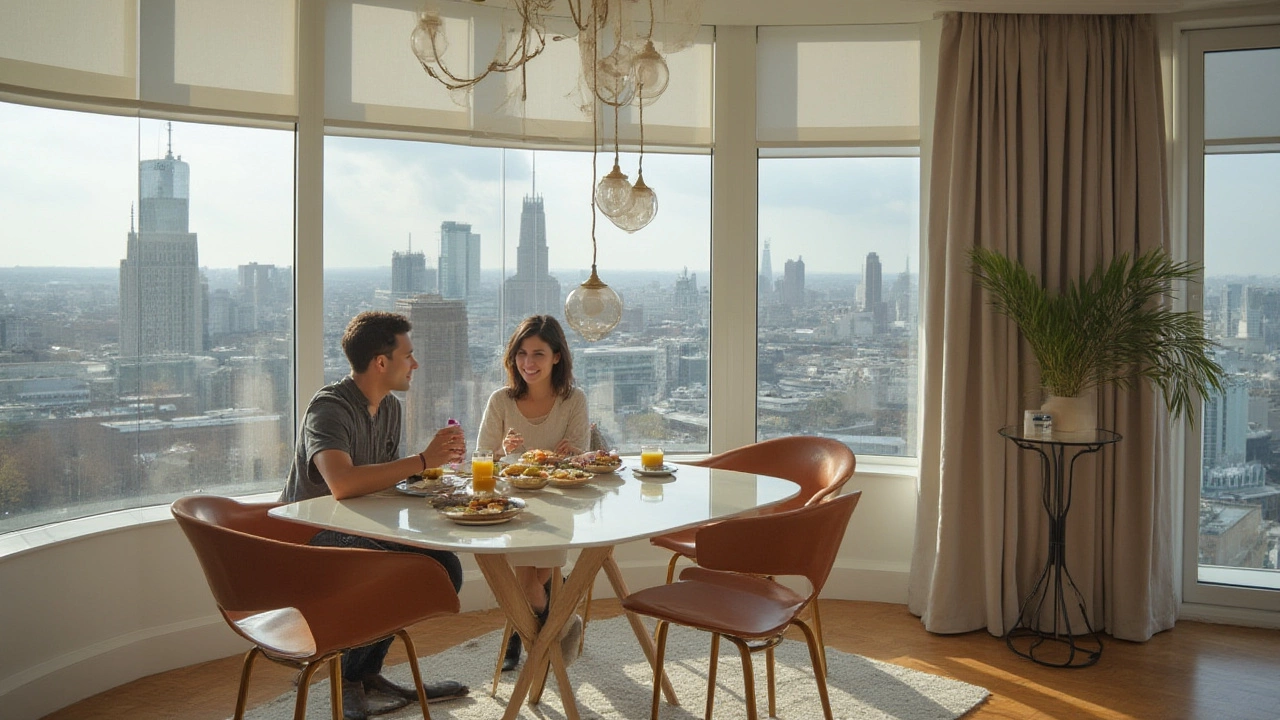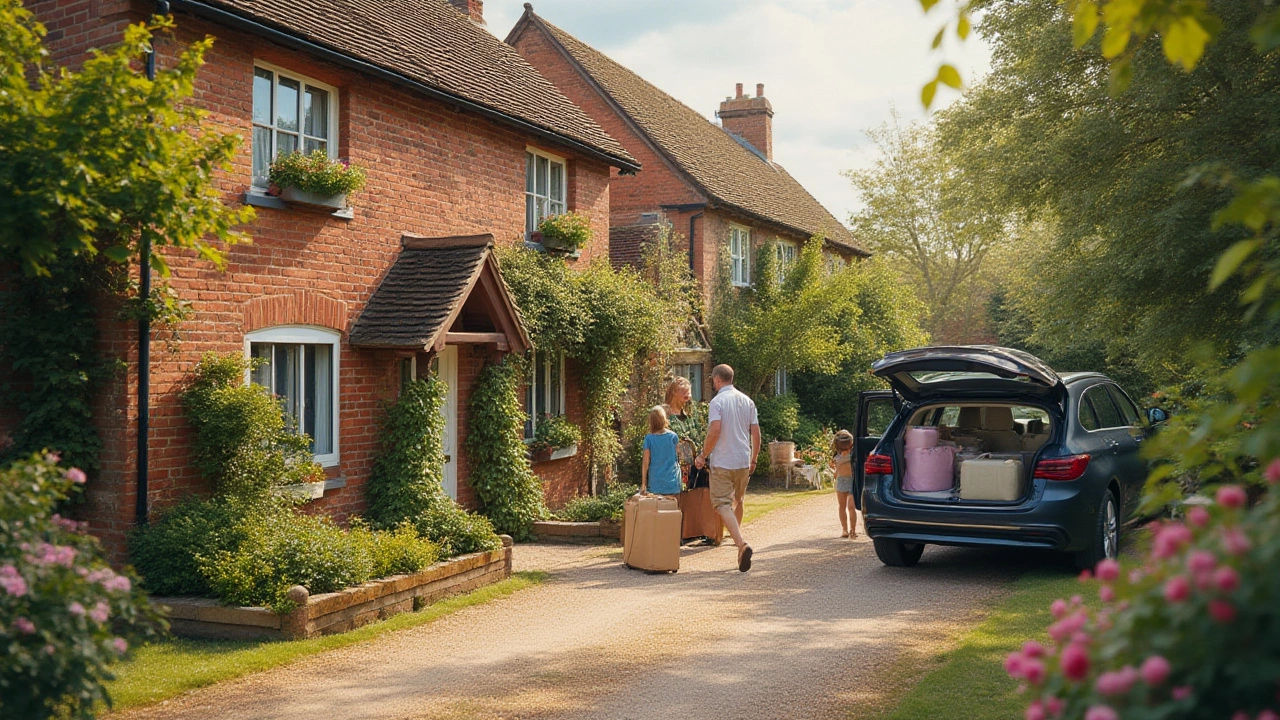Did you know the term “self-catering” exploded on Google Trends by over 170% once travel restrictions eased in 2021? People everywhere wanted freedom, flexibility—and frankly, kitchens they could trust after months of takeout! Self-catering accommodation unlocked travel that felt safer, but it also solved something we rarely consider: It’s a hassle when you’re locked into hotel meal times or charged three times more for a cuppa than you would pay anywhere else. If you prefer eating late, have food allergies, or just want to try cooking local specialties, self-catering keeps the rulebook in your pocket. So what actually counts as self-catering, and how do you pick the type that’s right for your adventure, family, or escape plan?
Holiday Homes: From Chic Beach Houses to Sleepy Suburban Retreats
Holiday homes are the go-to when you crave something that feels like, well, an actual home—but maybe a better, less cluttered version of your real one. These properties range from snazzy city apartments to sprawling beach villas and everything in between. You can rent a smart town house in Florence, a quirky barn conversion in Cornwall, or a family-friendly bungalow in the French countryside. What links it all? You get the whole place to yourself. No interruptions from room service or neighbors in the next suite sneezing at 6 a.m.
The market is vast: By 2024, the global vacation rental market passed $100 billion. According to data from Statista, around 70% of travelers booking longer stays (over a week) opt for holiday homes versus hotels. Why? Space. A standard hotel room is, honestly, tiny. With a holiday home, everyone gets a real door, a living room to actually live in, and—importantly for many parents—a kitchen for fussy breakfast eaters. Most come with free WiFi, TVs, laundry facilities, and often perks like pools or gardens. Think about this: A holiday home is nearly always a fixed price per night—not per person—making it seriously good value for families or friend groups.
What makes holiday homes a savvy pick isn’t just comfort. You’ll often find extras like bicycles for exploring, BBQs for lazy evenings, and board games hiding in the cupboard. The privacy level is hard to beat. Want to sunbathe in your pajamas all afternoon? No judgment. Want a midnight snack without sneaking past a grumpy night porter? The fridge is yours. Holiday homes work great for longer stays, remote working escapes, and anyone with dietary quirks that make buffets risky rather than fun.
But here’s the catch: Not all holiday homes are made equal. Sometimes the “cosy cottage” is a little too rustic, or the “modern loft” has questionable plumbing. Read reviews carefully, and don’t hesitate to ask for exactly what you need—double-check for essentials like parking, kitchen tools, and air conditioning if that’s a must for you. Some countries are stricter than others about hosting licenses, so it’s worth double-checking you’re booking through a reputable site like Airbnb, VRBO, or trusted local agencies.
One practical tip? Ask for a floor plan or photos of every room. Filters can make anything look good online, but reality needs a little more honesty. Don’t be shy about checking how close the nearest shops are if you’ll be cooking most nights, or whether the place is reachable by public transport if you won’t have a car. As of now, plenty of holiday homes offer flexible cancellation policies—a legacy of pandemic-era booking nightmares.
Families with young kids often find holiday homes safer and less stressful, especially when traveling with babies or children with special needs. You create your schedule, prep meals for picky eaters, and never stress about stares from strangers. Meanwhile, digital nomads are fanning out from cramped city apartments to rural escapes—turning any holiday home with decent WiFi into a remote office. When you want the freedom to set your own pace and space, “holiday home” is code for comfort with control.
Quick summary table for common amenities you’ll spot in holiday homes:
| Amenity | Holiday Homes |
|---|---|
| Private Kitchen | Nearly always |
| Separate Bedrooms | Yes |
| Private Bathrooms | Usually (sometimes shared) |
| Outdoor Space | Often (garden, patio, or balcony) |
| Parking | Frequently offered |
| Laundry Facilities | Common |

Serviced Apartments: City Stays Without the Hotel Rules
Serviced apartments are the city slickers of the self-catering world. If a hotel and an apartment had a baby, it would look like this: slick, modern, with hotel-style cleaning but lots more independence. These apartments are staples in big business hubs like London, New York, Singapore, and Sydney, with big chains and boutique companies slicing up city centers so you can stay somewhere central—usually in buildings peppered with other travelers, expats, or business folk on long assignments.
The charm is in the details: You get a full kitchen or at least a kitchenette, a real living area, usually a separate bedroom, and—bonus—a weekly clean that’s included. This makes serviced apartments one of the best secret weapons for business travelers, traveling medical professionals, or families who don’t want to live out of a suitcase for weeks. A 2024 survey from STR Global found that 69% of people staying longer than six nights in a city would pick a serviced apartment over a hotel—costs drop and comfort skyrockets.
For anyone who hates eating out three times a day, these apartments are a lifesaver. Stock up at local markets and whip up favorites or experiment with local ingredients. You’ll almost always have a fridge for storing leftovers and breakfast ingredients—no more hoping the croissants at the hotel buffet are fresh. Some buildings come with extras like gyms, washing machines, or even a shared lounge. Many mainstream apartment-hotels throw in high-speed WiFi, streaming-ready TVs, and sometimes even a 24-hour front desk for extra peace of mind.
Do you care about location? Serviced apartments are almost always within walking distance of transport lines, restaurants, museums, or parks. Traveling for work? These spots are designed for business nomads—with sturdy desks, plugs everywhere, reliable WiFi, and often discounted rates for weekly or monthly stays. With more people working remotely, the market’s grown fast: Global Industry Analysts’ 2023 report pegged the serviced apartment sector as growing at 8.2% annually, outstripping most other accommodation types.
You get flexibility. Want daily room cleaning? Usually, you can pay a bit extra. Need to store luggage pre- or post-check-in? Most buildings have a solution. Unlike classic hotels, you have your own living and dining pace. Surprising tip: Many serviced apartments allow pets—especially European chains. Handy for dog-walking travelers who don’t want a kennel bill or just need their fluffy sidekick for comfort. Don’t forget to ask, though, since the rules vary.
If you love exploring grocery stores for weird snacks, serviced apartments let you indulge guilt free. You can host friends, too—enjoy a takeaway in your pajamas or prep a meal for local pals. And if you’re traveling with a baby or toddler, the ability to prep bottles or blends just the way you do at home can make all the difference between a holiday and a headache.
Some drawbacks to weigh: Serviced apartments usually have house rules about noise, parties, and maximum guests. You won’t get a staffed bar or daily turndown service, but you will enjoy more living space, better value (especially for longer stays), and way fewer awkward lobby moments. They can book up fast—business travelers tend to lock in months ahead—so plan early in busy cities.
Here’s a quick comparison of what most serviced apartments offer compared to hotels:
| Feature | Serviced Apartment | Hotel |
|---|---|---|
| Kitchen Facilities | Full or partial | Rare |
| Washer/Dryer | Often provided | Occasionally (fee) |
| Space | Average 35-70m² | Average 20-40m² |
| Price per Night | Lower for long stays | Usually higher |
| Cleaning | Weekly or on request | Daily |

Country Cottages: Escape, Peace, and Loads of Local Charm
Now, let’s talk about country cottages. These are the storybook version of self-catering—think stone walls, roses around the door, a fireplace begging for board games, and maybe a garden bursting with herbs. Cottages come in every flavor, from thatched hideaways in the English Dales to timber-framed homes near Swiss lakes, or sunbaked farmhouses in Tuscany. These places are about atmosphere—inviting you to slow down and soak up local life, not just tick off tourist spots.
Cottages suit couples, families, or groups looking for privacy and space—but also a sense of place you simply won’t get at a Holiday Inn. They’re often run by local hosts rather than big rental companies, and you really feel it: You’ll find a welcome basket with homemade jam, fresh eggs from next door, or tips handwritten on a map for the best country walk. According to a 2024 VisitEngland report, bookings for cottages in rural UK locations hit record highs, up 28% since 2019, as travelers swarmed the countryside for safe, tranquil getaways post-pandemic.
There’s a romance in cottage stays: You wake up to birds, not traffic. You cook breakfast to your playlist, not background news. For families, it’s a no-brainer—no rigid restaurant times, no queues for toast, and if your kids want to stomp about outside, that’s half the point. Cottages almost always have private kitchens, living and dining rooms, and gardens or patios. Many offer wood-burning stoves, bookshelves crammed with real books, and, increasingly, kid and pet-friendly touches (baskets of toys, stair gates, safe enclosed gardens).
The quirks can be part of the fun, but also the challenge: Water pressure might be a little unpredictable, rooms a tad snug, or phone signal patchy. But the rewards—star-loaded skies, peace to write/read/rest, afternoons lost to rambling—outweigh any minor gripes. It’s about shutting out the sense of rushing that haunts most city breaks. Self-catering here means back-to-basics pleasures: shopping at a farmer’s market, cooking together, learning which wildflowers grow at the edge of your lawn.
One smart tip: Book early for prime seasons—summer and autumn in Europe, for example—cottages get snapped up well in advance. If you have allergies or food sensitivities, pack essentials or contact the host about what’s stocked in the kitchen. Most cottage owners pride themselves on hospitality: 80% of travelers in a 2023 Hostfully survey cited “helpful hosts” as a reason they’d book a cottage over a hotel.
Eco-friendly options are increasingly popular—think solar panels, rainwater recycling, and herb gardens. If you want to shrink your ecological footprint, search for “eco cottages” and check for certification logos. Some go the extra mile: Foraging tours with the owner, cooking lessons, or guided nature walks are not just holiday perks—they support rural communities.
If you want to unplug from tech, ask about WiFi but don’t be surprised if it’s patchy. Rural cottages are made for board games, classic novels, and long meals around the table. And if you’re worried about getting bored? Check the welcome folder—hidden gems include local festivals, quirky museums, and walking trails off the beaten path.
What makes country cottages distinct isn’t just looks—it’s the permission they give you to slow down. You swap traffic for birdsong, alarms for sunbeams, and hurried meals for drawn-out dinners. If you crave a digital detox or a holiday you’ll remember for small joys, the country cottage wins, every time. Just don’t forget the wellies!
To wrap it up: when you think about self-catering accommodation, you’re stepping into a world where your holiday flexes around your life, not the other way around. Whether you want a holiday home at the beach, an urban serviced apartment, or a country cottage with a storybook garden, every option opens up a different kind of freedom. It’s about making travel yours—wherever you unpack your suitcase.
